#federico ii
Text


Study time. 📚✨
#college#school#student#studyblr#study motivation#studyspo#study blog#study notes#study inspiration#history#litterature#study with me#italy#federico ii
54 notes
·
View notes
Text
today I've finished this ugly bitch I made for @igor-kazzc

its the first drawings I color in a serious way in digital yay
(don't ask about the eagle I drew it from memory)
7 notes
·
View notes
Text
While I was absent from this precious website, I've been working on one lil thing, essentially a transcript of a small document from the court of Frederick II (December 1222)
Long story short: I saw a photo of it on Wikimedia with no transcript of the Latin text (they sometimes include transcripts but not in this case), decided I was curious what's the doc about, and started working on the transcript
I've finished the beta version of the transcript, but before I upload it to Wikimedia I wanted to ask y'all here to look it through. I don't know Latin (sad, I know), so there can be stupid mistakes with verbs' conjugations 'n' stuff like that. I would really appreciate any help here
Guide:
Round brackets (in bold) are for my comments and where commas could be placed.
Square brackets are for dots in the original document (I have no idea what they mean: truncation, full stop, or smth else) and incomprehensible words (at least I didn't get 'em)
By the way many thanks to Arizona Tea (kept my sanity) and @mformarsala (helped a lot). Love you both
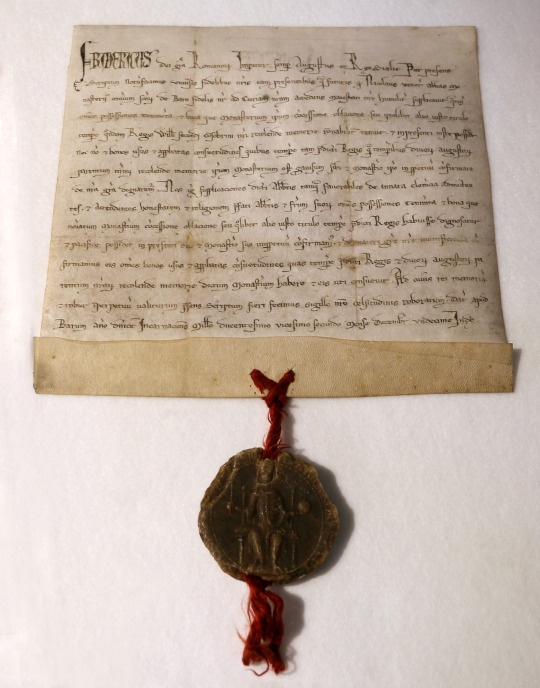
(Source of the photo: Sailko, CC BY-SA 4.0 https://creativecommons.org/licenses/by-sa/4.0, via Wikimedia Commons)
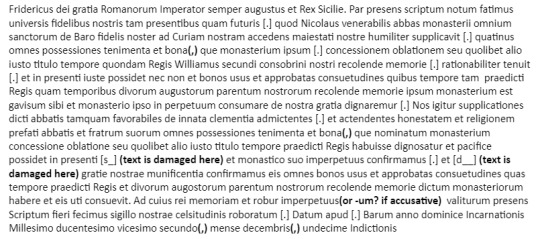
(Source of the transcript: Me, Myself, and I, id est duke-of-hellsite)
(if you need a text file vers of the transcript - dm me)
#federico ii#frederick ii#middle ages#duke’s thoughts#I should make another tag for smth like this#duke's works
7 notes
·
View notes
Text
Volti dei tre anziani della Cattedrale di Termoli

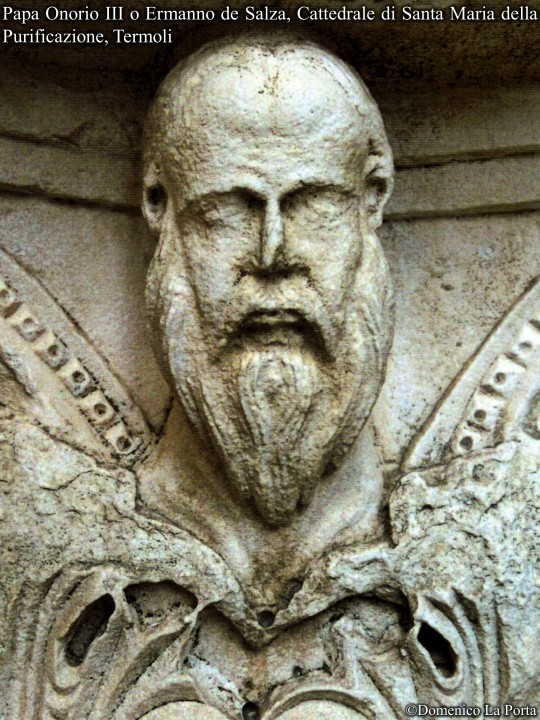
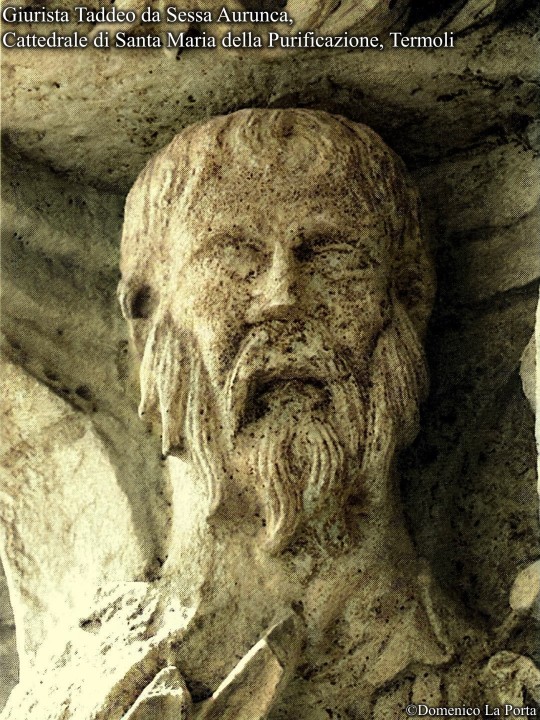
Nel lato sinistro del capitello, il consigliere e giurista di Federico II, Pier delle Vigne, mentre nel lato destro abbiamo il secondo giurista più vicino all'imperatore, Taddeo da Sessa, e nel centro, un anziano dalla lunga barba ed il volto malinconico o dolente, identificabile come il pontefice Onorio III, magister regis dell'infante Federico, oppure il terzo più importante consigliere di quest'ultimo, il gran maestro teutonico Ermanno de Salza.
Cattedrale di Santa Maria della Purificazione, Termoli (CB), prima metà del XIII secolo (1225-1235), secondo capitello del lato sinistro della facciata principale.
#storia#molise#italia#termoli#medioevo#archeologia#arte#cultura#federico ii#federico ii di svevia#italy#frederick ii#hohenstaufen#papa Onorio III#Onorio III#Ermanno de Salza#Hermann Von Salza#Pier delle Vigne#Taddeo da Sessa#art#medieval art#13th century#medieval europe#normanni#svevi#romanico#architettura#storia dell'arte#architecture#cattedrale
4 notes
·
View notes
Text

frederick ii

MEOW
8 notes
·
View notes
Text
Sì, certo, ieri si commemorava la nascita di Isaac Newton, ma oggi chi manda assieme a me un pensiero a Federico II?
#federico ii#frederick ii#26 dicembre#december 26th#hre#regno di Sicilia#frederick ii of swabia#Federico ii di svevia
2 notes
·
View notes
Text
I’m reading again Ernst Kantorowicz biography about Emperor Frederick II Hohenstaufen and I happened in one of my favourite parts, the one dedicated of course to Pier delle Vigne.

This is so huge (to me) because the author here is describing Frederick and Pier basically as the “You Don`t Know Him Like I Do 😤 “ trope to each other.
(But also: the image of a ruler and of his closest collaborator that works so good together that their plural ideas became easily one, that after eight centuries the outcomes of their partnership is still considered indivisible, you can’t understand when one finish and the other one starts etc etc).
#pier delle vigne#pier/federico#federico ii#emperor frederick ii#Frederick II Hohenstaufen#pier della vigna#Ernst Kantorowicz#King Manfred’s letters in della Vigna’s style disclose a painful discrepancy#girl?#ah yes sometimes is forgotten but after his death Pier delle Vigne was still considered a traitor BUT his style and works#were transmitted by his pupils and students - many of them remembered him fondly like Nicola da Rocca which after the fall of the Hohenstauf#dinasty saved the papers of his old master and that's to him that we have a lot of Pier de#delle Vigne surviving work#italian history#sicilian history#medieval history#13th century
9 notes
·
View notes
Text
youd think now that i study art history my interests would change. jokes on you ive been thinking about this bust of federico ii for two years

11 notes
·
View notes
Photo





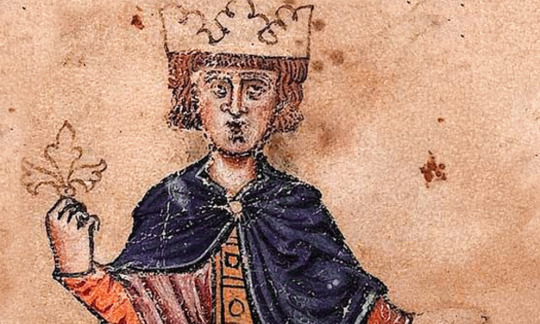
May 17th 1198. A 4 years-old Federico II Hohenstaufen is crowned King of Sicily
Soon after the death of the Emperor Henry, Constance had the child fetched from Foligno by an Apulian count and brought to Sicily. Dressed in widow’s weeds she awaited her son in Palermo. There were grave accusatory rumours against the Empress current at the time: some said she had poisoned her husband, and it was a matter of common knowledge that she had no love for Germans. The suspicion of murder was unjust, but the hatred for Germans ascribed to her was genuine enough; she shared it with her Sicilian fellow-countrymen and with the Italians oppressed by the Roman Curia. The foundations of this hate were the same then as they have always been: the arrogance "allied with unwisdom" of the Germans alienated the Mediterranean peoples, as did their "obstinacy and self-assertiveness."
Their physical strength and their savagery moreover terrified the Southerners, the discords prevailing amongst themselves brought them scorn and contempt. For rulers of the world they appeared "crude, coarse and uncivilised,” while their yet unpolished language seemed to the Romans "like the barking of dogs and the croaking of frogs." But the main factor in this hate was fear; fear of the inrush "of the winter and the storm into the rose-gardens of Sicily." This fear was not allayed by the savagely cruel treatment meted out to the Sicilians by Henry VI. Perhaps Innocent with his biblical phraseology hit on the right description of the German visitation of those days when he wrote: "Because the people of Sicily and the other inhabitants of this kingdom have grown effeminate in sloth, and undisciplined through too much peace, and, boasting themselves of their wealth, have given themselves over to the unbridled lusts of the body, their stink has gone up to heaven and the multitude of their sins has delivered them into the hands of the oppressor."
Innocent spoke thus out of no friendliness to the Germans. The hate of Germans that flamed up throughout Italy on the death of the Emperor had been carefully nurtured beforehand by the Curia, had been given the air of a national pan-Italian movement and utilised as a means to shake off the imperial yoke in the south in favour of a papal Italy. In resonant periods Innocent III had taken pains to stir up and foster this hate: "The wrath of the North wind whistles through the mountains with a new quaking of the earth, it drives through the level plains of Apulia, whirling dust into the eyes of wanderers and country-dwellers." Thus he wrote about the German,Henry VI, whom Dante also designated "that loud blast which blew the second over Swabia’s realm." A reaction of this sort against the tyranny of Henry VI was of course inevitable. The importance of the movement in Sicily was enhanced by the fact that the Empress Constance took part in it. Her motives were probably personal, for Henry had made a terrific clearance amongst all related to the old Norman royal house and had banished the survivors to Germany. On his death Constance immediately resumed the sovereignty of her hereditary domain, in accordance both with the Emperor’s instructions and with the right she herself possessed as Norman Queen. But the new ruler of Sicily was Norman Queen only: not widowed Empress; and the first act of her reign was to banish from her kingdom the Emperor’s interpreter, Markward of Anweiler, and with him all other German notables, a considerable number of whom held fief and office in the Norman territory. The pretext was that they might prove dangerous to the peace and quiet of the kingdom,especially Markward, who had not been slow to propose himself as vicegerent. Her next step was to imprison the Sicilian Chancellor, Walter of Palear, Bishop of Troia, who had been from of old an opponent of the Norman dynasty and a willing tool of the German Emperor. The intervention of the Pope was necessary to effect the liberation of the Bishop Chancellor and his re-instatement in his former offices. AntiGerman feeling in the south was so acute that the first German crusaders who were returning, all unsuspecting, from the Holy Land were surprised and plundered by the excited Sicilians, and after that the home-coming pilgrims had to avoid the har bours of this dangerously inhospitable kingdom. Curiously, the German princes who were on the Crusade, when they received in Acre the news of their Emperor’s death, reconfirmed the choice of Frederick as King of the Romans.
Constance, however, deliberately shut her eyes to all this. Her hate of Germany reinforced the maternal anxiety which heroes’ mothers are wont to suffer from: in the German crown she saw a never-ending series of future perils and struggles for her son. She would as far as possible ward off such a danger from him. Frederick should be king of the wealthy Sicily, and in the southern Land of Dreams he would quietly forget the imperial dignity of his fathers. A few months after the boy’s arrival in Palermo she had him crowned King of Sicily. The solemn rite was celebrated on Whit Sunday 1198, with a pomp and ceremony borrowed from the Byzantine court, while in accordance with ancient custom the people greeted their newly crowned king with the cry which may still be read on every crucifix in southern Italy "Christus vincit, Christus regnat, Christus imperat." It is significant to note that this is also the motto engraved on Frederick’s early seals. From that day Constance omitted from all official documents of the young king the title that had previously figured there: Rex Romanorum. From henceforth Frederick of Hohenstaufen was to content himself with the many titles borne by the reges felices of Norman stock. He was to be, body and soul, the son of the Sicilian Constance only, and to be kept aloof from all the fatal, unknown consequences in which the dangerous Hohenstaufen blood of his father might involve him. One is reminded of the childhood of Achilles or of Parzival.
Kantorowicz Ernst, Frederick II. 1198-1250, p. 13-16
#women#history#historicwomendaily#women in history#historical women#costanza i#Federico II#House of Hauteville#House of Hohenstaufen#norman swabian sicily#people of sicily#women of sicily#Palermo#province of palermo#yeah i know i was supposed to post it yesterday orz#you go constance coco
40 notes
·
View notes
Text
Hold up hold up, this is precious information

The 12th of February 1240 Frederico writes to Riccardo di Pulcar suggesting that he invite Teodoro philosopho et fideli nostro ut de sciropis et zuccaro violaceo tam ad opus nostram faciat quam ad opus Camere nostre: this way the sick Pier della Vigna will have a box of the precious balm.
#Frederick II taking care of sick Pier della Vigna. need I say more?#Federico II#Pier della Vigna#medioevo
15 notes
·
View notes
Text
"Io son colui che tenni ambo le chiavi
del cor di Federigo, e che le volsi,
serrando e diserrando, sì soavi,
che dal secreto suo quasi ogn’uom tolsi"
𝐷𝑖𝑣𝑖𝑛𝑎 𝐶𝑜𝑚𝑚𝑒𝑑𝑖𝑎, 𝐼𝑛𝑓𝑒𝑟𝑛𝑜, 𝐶𝑎𝑛𝑡𝑜 𝑋𝐼𝐼𝐼
Devo dire che sta parte è un po' gay, giusto un pochino.
#divina commedia#inferno#dante alighieri#pier delle vigne#federico II#non ci sono abbastanza fanfiction su di loro
1 note
·
View note
Photo
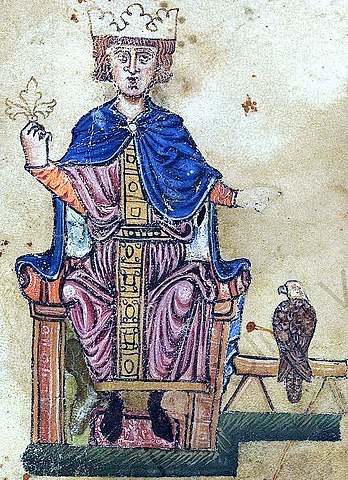
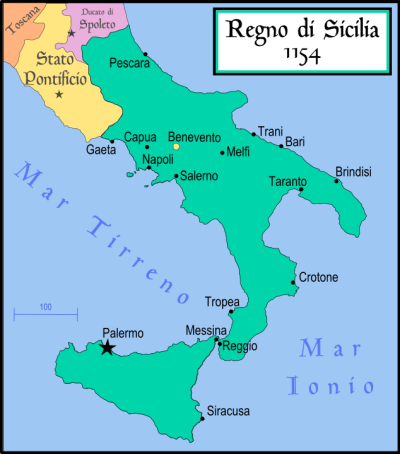

(via Appunti di storia della Sicilia)
Questo periodo ebbe sviluppi incredibili sul piano della giurisprudenza, della letteratura in latino, delle scienze sperimentali e della poesia in volgare.
1 note
·
View note
Text
While y’all trying to get over Christmas, I want to wish a Happy Birthday to history’s favourite Antichrist

143 notes
·
View notes
Text
Federico II di Svevia, Castello di Monte San Giovanni Campano.
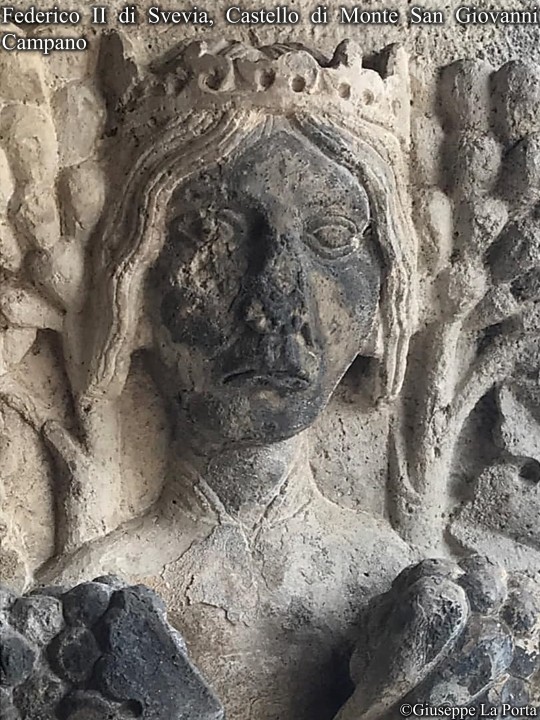
Opera della prima metà del XIII secolo.
#italia#medioevo#storia#archeologia#arte#cultura#federico ii#federico ii di svevia#Monte San Giovanni Campano#frederick ii#hohenstaufen#svevia#italy#history#storia dell'arte#art#medieval art#13th century#architettura#architecture
3 notes
·
View notes
Text

Merry Christmas from the Hohenstaufen family 🎄🎄🎄
3 notes
·
View notes
Photo


IX, I prigioni — X, L’imperatore
Giovanni Pascoli, Le canzoni di re Enzio
Encius listens to the beats of his heart.
He thinks of his father. Federicus Augustus
is like God, as silent as he is restless.
Yes. He sleeps in a Cathedral,
within the eternal porphyry of his coffer.
#giovanni pascoli#le canzoni di re enzio#enzo di sardegna#federico ii#translation by me#poems that make a girl scream and cry and throw up
28 notes
·
View notes